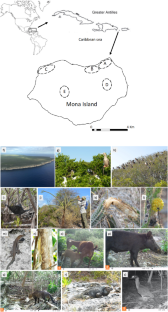Oecologia ( IF 2.7 ) Pub Date : 2024-04-10 , DOI: 10.1007/s00442-024-05546-7 Walter D. Espíndola , Tomás A. Carlo

|
Seabirds create fluxes of nutrients from marine to terrestrial ecosystems that influence the food webs of small islands. We investigated how guano inputs shape terrestrial food webs by comparing species of selected plant and animal species in a red-footed booby colony in Mona Island (Puerto Rico, Caribbean Sea), to sites of the island lacking guano inputs. We quantified guano deposition and its relationship to plant biomass production, fecundity and density, as well as the activity of native and introduced animal species. In general, guano inputs increased the gross primary plant productivity, size, and fecundity by twofold. Guano inputs were also associated with twofold increases in density of Anole lizards, but also to increases in the activity of introduced pigs (> 500%), goats (> 30%), and cats (> 500%), which negatively impact native species. In particular, elevated pig and cat activity within the booby colony was correlated with lower activity of endemic ground lizards and of introduced rats. Our results also suggest that severe droughts associated with climate change exacerbate the negative effects that introduced species have on vegetation and reduce the positive effects of seabird guano inputs. Our findings underscore the importance of allochthonous guano inputs in subsidizing plant productivity and native and endemic species in small oceanic islands, but also in increasing the negative impacts of introduced mammals. Management and conservation efforts should focus on the exclusion (or eradication) of introduced mammals, particularly pigs and goats, from remnant seabird colonies in Mona Island.
中文翻译:

海鸟鸟粪输入增加了引进哺乳动物对大洋岛屿本土动植物的影响
海鸟产生从海洋到陆地生态系统的营养通量,影响小岛屿的食物网。我们通过比较莫纳岛(波多黎各,加勒比海)红脚鲣鸟栖息地中选定的植物和动物物种与缺乏鸟粪输入的岛屿的地点,研究了鸟粪输入如何塑造陆地食物网。我们量化了鸟粪沉积及其与植物生物量生产、繁殖力和密度以及本地和引进动物物种的活动的关系。一般来说,鸟粪投入使初级植物的总生产力、规模和繁殖力增加了一倍。鸟粪输入还与变色蜥蜴密度的两倍增加有关,而且还与引进的猪 (> 500%)、山羊 (> 30%) 和猫 (> 500%) 的活动增加有关,这对本地物种产生了负面影响。特别是,鲣鸟群内猪和猫活动的增加与地方性地面蜥蜴和引入的大鼠活动的减少相关。我们的研究结果还表明,与气候变化相关的严重干旱加剧了引进物种对植被的负面影响,并减少了海鸟鸟粪输入的积极影响。我们的研究结果强调了外来鸟粪输入对于补贴小海洋岛屿的植物生产力和本地和特有物种的重要性,但也增加了引入哺乳动物的负面影响。管理和保护工作应重点关注从莫纳岛残余海鸟栖息地排除(或根除)引入的哺乳动物,特别是猪和山羊。



























 京公网安备 11010802027423号
京公网安备 11010802027423号